大学英语听说课程教学大纲
- 格式:doc
- 大小:300.00 KB
- 文档页数:47
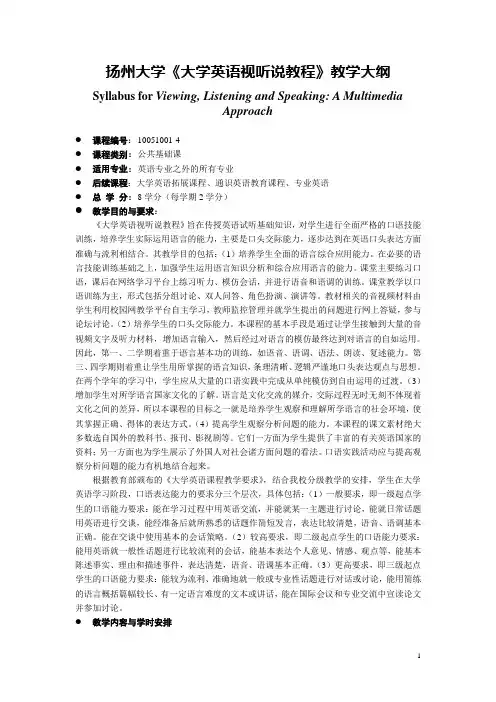
扬州大学《大学英语视听说教程》教学大纲Syllabus for Viewing, Listening and Speaking: A MultimediaApproach●课程编号:10051001-4●课程类别:公共基础课●适用专业:英语专业之外的所有专业●后续课程:大学英语拓展课程、通识英语教育课程、专业英语●总学分:8学分(每学期2学分)●教学目的与要求:《大学英语视听说教程》旨在传授英语试听基础知识,对学生进行全面严格的口语技能训练,培养学生实际运用语言的能力,主要是口头交际能力,逐步达到在英语口头表达方面准确与流利相结合。
其教学目的包括:(1)培养学生全面的语言综合应用能力。
在必要的语言技能训练基础之上,加强学生运用语言知识分析和综合应用语言的能力。
课堂主要练习口语,课后在网络学习平台上练习听力、模仿会话,并进行语音和语调的训练。
课堂教学以口语训练为主,形式包括分组讨论、双人问答、角色扮演、演讲等。
教材相关的音视频材料由学生利用校园网教学平台自主学习,教师监控管理并就学生提出的问题进行网上答疑,参与论坛讨论。
(2)培养学生的口头交际能力。
本课程的基本手段是通过让学生接触到大量的音视频文字及听力材料,增加语言输入,然后经过对语言的模仿最终达到对语言的自如运用。
因此,第一、二学期着重于语言基本功的训练,如语音、语调、语法、朗读、复述能力。
第三、四学期则着重让学生用所掌握的语言知识,条理清晰、逻辑严谨地口头表达观点与思想。
在两个学年的学习中,学生应从大量的口语实践中完成从单纯模仿到自由运用的过渡。
(3)增加学生对所学语言国家文化的了解。
语言是文化交流的媒介,交际过程无时无刻不体现着文化之间的差异,所以本课程的目标之一就是培养学生观察和理解所学语言的社会环境,使其掌握正确、得体的表达方式。
(4)提高学生观察分析问题的能力。
本课程的课文素材绝大多数选自国外的教科书、报刊、影视剧等。
它们一方面为学生提供了丰富的有关英语国家的资料;另一方面也为学生展示了外国人对社会诸方面问题的看法。
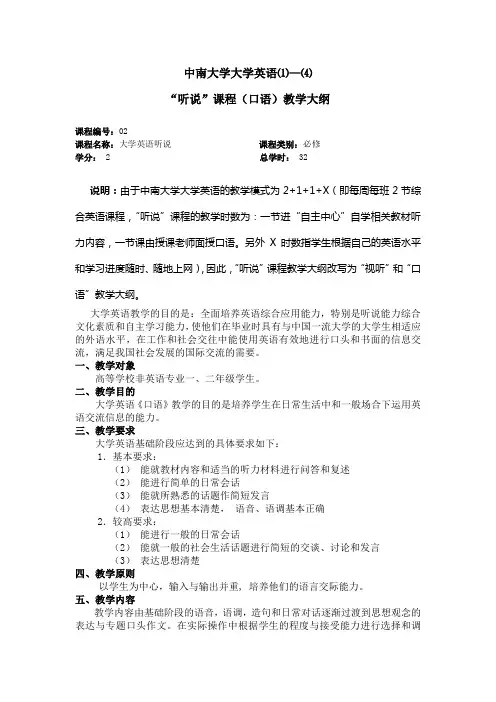
中南大学大学英语⑴—⑷“听说”课程(口语)教学大纲课程编号:02课程名称:大学英语听说课程类别:必修学分:2 总学时: 32说明:由于中南大学大学英语的教学模式为2+1+1+X(即每周每班2节综合英语课程,“听说”课程的教学时数为:一节进“自主中心”自学相关教材听力内容,一节课由授课老师面授口语。
另外X时数指学生根据自己的英语水平和学习进度随时、随地上网),因此,“听说”课程教学大纲改写为“视听”和“口语”教学大纲。
大学英语教学的目的是:全面培养英语综合应用能力,特别是听说能力综合文化素质和自主学习能力,使他们在毕业时具有与中国一流大学的大学生相适应的外语水平,在工作和社会交往中能使用英语有效地进行口头和书面的信息交流,满足我国社会发展的国际交流的需要。
一、教学对象高等学校非英语专业一、二年级学生。
二、教学目的大学英语《口语》教学的目的是培养学生在日常生活中和一般场合下运用英语交流信息的能力。
三、教学要求大学英语基础阶段应达到的具体要求如下:1.基本要求:(1)能就教材内容和适当的听力材料进行问答和复述(2)能进行简单的日常会话(3)能就所熟悉的话题作简短发言(4)表达思想基本清楚,语音、语调基本正确2.较高要求:(1)能进行一般的日常会话(2)能就一般的社会生活话题进行简短的交谈、讨论和发言(3)表达思想清楚四、教学原则以学生为中心,输入与输出并重, 培养他们的语言交际能力。
五、教学内容教学内容由基础阶段的语音,语调,造句和日常对话逐渐过渡到思想观念的表达与专题口头作文。
在实际操作中根据学生的程度与接受能力进行选择和调整。
其具体教学内容如下:1.语音和语调(1)音素(2)重音(3)连读(4)升调与降调(5)意群2.通过日常用语与对话进行语言功能意念训练1)一般表示法(1)问候、介绍(2)邀请、提议(3)祝贺、称赞(4)道歉、遗憾(5)意愿、决定(6)同意、不同意(7)喜恶、抱怨(8)判断、观点(9)建议、劝说(10)可能、不可能(11)相信、怀疑(12)高兴、恼怒(13)担忧、焦虑(14)满意、失望(15)兴趣、强调(16)解释、定义(17)争辩、澄清2)情景表示法(1)学校(2)节日(3)交通(4)广告(5)成功(6)旅行(7)运动(8)医院(9)娱乐(10)电脑(11)手机(12)网络(13)自然资源等等3.思想观念的表达与口头作文(1)与《综合课程》课文相关的主题讨论(2)故事的复述与评论(3)新闻与社会话题评述(4)以大学生活为主题的口头作文4.“精彩影视片断”的评述和讨论六、教学安排大学英语基础阶段的口语开设四个学期。
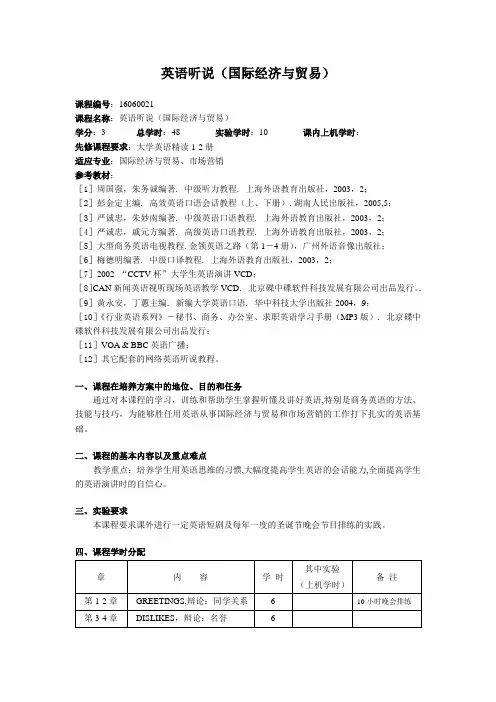
英语听说(国际经济与贸易)课程编号:16060021课程名称:英语听说(国际经济与贸易)学分:3 总学时:48 实验学时:10 课内上机学时:先修课程要求:大学英语精读1-2册适应专业:国际经济与贸易、市场营销参考教材:[1]周国强,朱务诚编著.中级听力教程.上海外语教育出版社,2003,2;[2]彭金定主编.高效英语口语会话教程(上、下册).湖南人民出版社,2005,5;[3]严诚忠,朱妙南编著.中级英语口语教程.上海外语教育出版社,2003,2;[4]严诚忠,戚元方编著.高级英语口语教程. 上海外语教育出版社,2003,2;[5]大型商务英语电视教程.金领英语之路(第1-4册),广州外语音像出版社;[6]梅德明编著.中级口译教程.上海外语教育出版社,2003,2;[7]2002 “CCTV杯”大学生英语演讲VCD;[8]CAN新闻英语视听现场英语教学VCD.北京碟中碟软件科技发展有限公司出品发行。
. [9]黄永安,丁蕙主编.新编大学英语口语.华中科技大学出版社2004,9;[10]《行业英语系列》-秘书、商务、办公室、求职英语学习手册(MP3版).北京碟中碟软件科技发展有限公司出品发行;[11]VOA & BBC英语广播;[12]其它配套的网络英语听说教程。
一、课程在培养方案中的地位、目的和任务通过对本课程的学习,训练和帮助学生掌握听懂及讲好英语,特别是商务英语的方法、技能与技巧,为能够胜任用英语从事国际经济与贸易和市场营销的工作打下扎实的英语基础。
二、课程的基本内容以及重点难点教学重点:培养学生用英语思维的习惯,大幅度提高学生英语的会话能力,全面提高学生的英语演讲时的自信心。
三、实验要求本课程要求课外进行一定英语短剧及每年一度的圣诞节晚会节目排练的实践。
四、课程学时分配五、考核方式本课程采取口试考试方式,结合平时成绩进行综合评定。
六、制订执笔者:王咏梅审核者:冯正强批准者:龚艳萍。
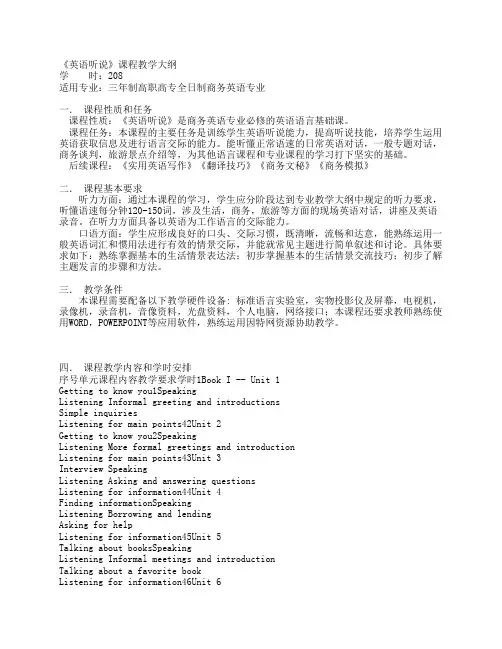
《英语听说》课程教学大纲学 时:208适用专业:三年制高职高专全日制商务英语专业一. 课程性质和任务 课程性质:《英语听说》是商务英语专业必修的英语语言基础课。
课程任务:本课程的主要任务是训练学生英语听说能力,提高听说技能,培养学生运用英语获取信息及进行语言交际的能力。
能听懂正常语速的日常英语对话,一般专题对话,商务谈判,旅游景点介绍等,为其他语言课程和专业课程的学习打下坚实的基础。
后续课程:《实用英语写作》《翻译技巧》《商务文秘》《商务模拟》二. 课程基本要求 听力方面:通过本课程的学习,学生应分阶段达到专业教学大纲中规定的听力要求,听懂语速每分钟120-150词,涉及生活,商务,旅游等方面的现场英语对话,讲座及英语录音。
在听力方面具备以英语为工作语言的交际能力。
口语方面:学生应形成良好的口头、交际习惯,既清晰,流畅和达意,能熟练运用一般英语词汇和惯用法进行有效的情景交际,并能就常见主题进行简单叙述和讨论。
具体要求如下:熟练掌握基本的生活情景表达法;初步掌握基本的生活情景交流技巧;初步了解主题发言的步骤和方法。
三. 教学条件 本课程需要配备以下教学硬件设备: 标准语言实验室,实物投影仪及屏幕,电视机,录像机,录音机,音像资料,光盘资料,个人电脑,网络接口;本课程还要求教师熟练使用WORD,POWERPOINT等应用软件,熟练运用因特网资源协助教学。
四. 课程教学内容和学时安排序号单元课程内容教学要求学时1Book I -- Unit 1Getting to know you1SpeakingListening Informal greeting and introductionsSimple inquiriesListening for main points42Unit 2Getting to know you2SpeakingListening More formal greetings and introductionListening for main points43Unit 3Interview SpeakingListening Asking and answering questionsListening for information44Unit 4Finding informationSpeakingListening Borrowing and lendingAsking for helpListening for information45Unit 5Talking about booksSpeakingListening Informal meetings and introductionTalking about a favorite bookListening for information46Unit 6What's your hometownSpeakingListening Word stressSpeech practice: Group discussionsListening for information47Unit 7Where SpeakingListening Asking and giving directionsListening for detail48Unit 8Invitations SpeakingListening Giving and accepting invitationListening for detail49Unit 9Talking about TV andmovieSpeakingListening Arriving at the partyListening for detail410Unit 10What's your favoriteMusic?SpeakingListening Giving thanks and saying goodbyeListening for detail411Unit 11Under the weatherSpeakingListening Personal inquiriesListening for detail412Unit 12Sport SpeakingListening Making arrangementsListening for detail4复习考试413Book II - Unit 1New faces, new friendsSpeakingListening Informal greetings and introductionListening for information414Unit 2Talking abouttechnologySpeakingListening Expressing existence, availabilityand surpriseListening: Similarities and difference415Unit 3Facts and figuresSpeakingListening Expressing quantity, duration, existence and approximation Note-making4序号单元课程内容教学要求学时16Unit 4Let's go to a movie!SpeakingListening Giving, accepting and refusinginvitationsDescriptions of films417Unit 5Talking about languageSpeakingListening Talking about abilityListening for information418Unit 6Help!SpeakingListening Reporting an emergencyListening for information419Unit 7Space researchSpeakingListening Asking for and giving help and adviceListening for information420Unit 8Sources of informationSpeakingListening Expressing likes and dislikesSpot dictation421Unit 9Talking about foodSpeakingListening Expressing wantsListening for detail422Unit 10Using the telephoneSpeakingListening Telephone messagesListening for information423Unit 11International communicationsSpeakingListening Making promisesListening for information424Unit 12Shopping SpeakingListening Asking the wayCompound dictation4复习考试425Unit III - Unit 1How do you do!SpeakingListening Informal and formal greeting and self-introductions Spot dictation426Unit 2Introducing a speakerSpeakingListening Informal and formal self-introductionsSpot dictation427Unit 3Giving a speechSpeakingListening Asking & answering questions in formal situations Taking notes on a speech428Unit 4A trip down the riverSpeakingListening Making arrangementsHow to give a speech429Unit 5The motion picture industrySpeakingListening Giving, accepting and declining invitationWriting and giving a speech430Unit 6Help! My computer's downSpeakingListening Asking for and giving adviceCompound dictationListening and giving note-making431Unit 7Come for a mealSpeakingListening Giving, accepting and declining a meal invitation Listening and giving note-making4序号单元课程内容教学要求学时32Unit 8Breaking the iceSpeakingListening Talking over a mealListening and giving note-making433Unit 9Welcome to the US!SpeakingListening Giving informationListening and giving note-making434Unit 10Talking about energySpeakingListening Asking for and giving informationListening and giving note-making435Unit 11Money makes the world go roundSpeakingListening Expressing needsCompound dictation436Unit 12The world of workSpeakingListening Performing in a job interviewListening comprehension4复习考试437Book IV - Unit 1Learning strategiesSpeakingListeningCommunication strategiesInformal and formal ways of asking for advice Spot dictationDiscussion 438Unit 2On the way to AustraliaSpeakingListeningCommunication strategiesMaking travel arrangementsHow to give a speechMaking new friends439Unit 3On vacationSpeakingListeningCommunication strategiesTalking about a hotelListening and note-makingMaking complaints440Unit 4Visiting "down under"SpeakingListeningCommunication strategiesArriving at the airportNegotiating tacticsNegotiating441Unit 5Good healthSpeakingListeningCommunication strategiesAgreeing and disagreeingHow to organize a debateDebating442Unit 6Talking is good for youSpeakingListeningCommunication strategiesSmall talkListing comprehensionPresenting yourself443Unit 7Fire safetySpeakingListeningCommunication strategiesGiving instructions, advice and reasonGiving a presentation444Unit 8How happy are you?SpeakingListeningCommunication Discussing the results of a questionnaireSocial interaction strategies4序号单元课程内容教学要求学时45Unit 9Talking about scienceSpeakingListeningCommunication strategiesTelevision interviewsCompound dictationInterview on TV and radio446Unit 10Nice weather for the time of year!SpeakingListeningCommunication strategiesSmall talkCompound dictationPresentations447Unit 11New ideasSpeakingListeningCommunication strategiesTalking about a science documentaryPresentation448Unit 12Truth is stranger than fictionSpeakingListeningCommunication strategiesTalking about booksExpressing preferenceDebate4复习考试4学时总计208五. 教学方法 本课程注重理论教学与实践教学的有机结合,在教学中以实践和训练为主,最大限度为学生提供实践机会。
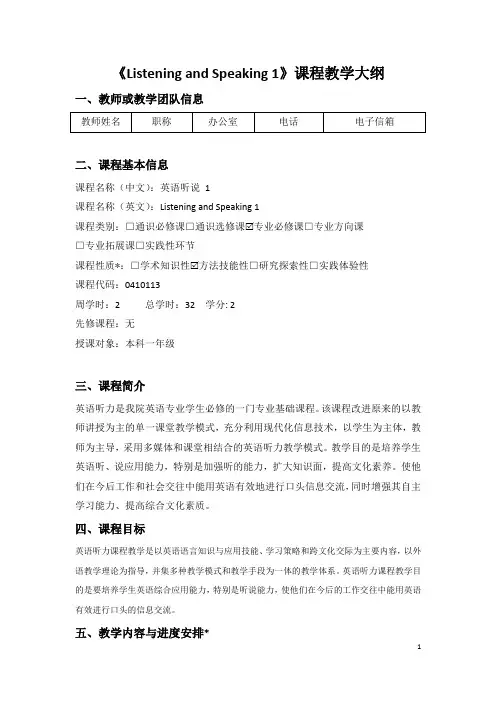
《Listening and Speaking 1》课程教学大纲一、教师或教学团队信息二、课程基本信息课程名称(中文):英语听说 1课程名称(英文):Listening and Speaking 1课程类别:□通识必修课□通识选修课 专业必修课□专业方向课□专业拓展课□实践性环节课程性质*:□学术知识性 方法技能性□研究探索性□实践体验性课程代码:0410113周学时:2 总学时:32 学分: 2先修课程:无授课对象:本科一年级三、课程简介英语听力是我院英语专业学生必修的一门专业基础课程。
该课程改进原来的以教师讲授为主的单一课堂教学模式,充分利用现代化信息技术,以学生为主体,教师为主导,采用多媒体和课堂相结合的英语听力教学模式。
教学目的是培养学生英语听、说应用能力,特别是加强听的能力,扩大知识面,提高文化素养。
使他们在今后工作和社会交往中能用英语有效地进行口头信息交流,同时增强其自主学习能力、提高综合文化素质。
四、课程目标英语听力课程教学是以英语语言知识与应用技能、学习策略和跨文化交际为主要内容,以外语教学理论为指导,并集多种教学模式和教学手段为一体的教学体系。
英语听力课程教学目的是要培养学生英语综合应用能力,特别是听说能力,使他们在今后的工作交往中能用英语有效进行口头的信息交流。
五、教学内容与进度安排*六、修读要求(满足对应课程标准的第3条)课程学习要求学生按时上课,按时交作业。
考试中严格要求学术诚信。
课堂内外学习应达到1:1的标准,也就是1节课的课内教学会安排学生1节课时间的课外操练,教师在学期开始时就把课程学习的要求交代清楚。
七、学习评价方案本课程的考核与评价规则包括1.每堂课的课内都有笔头和书面的作业,这些作业都以平时分算入学期总评2.期中考试没有固定的形式,课程会以学期的项目展示(与课文内容相关的presentation)作为期中成绩评价形式和评价标准3.学生的课堂表现、课后作业都计入平时分数计入总分等部分。
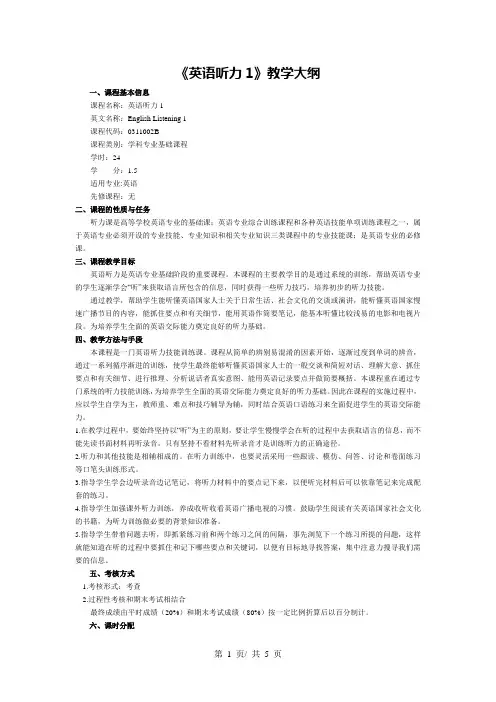
《英语听力1》教学大纲一、课程基本信息课程名称:英语听力1英文名称:English Listening 1课程代码:0311002B课程类别:学科专业基础课程学时:24学分:1.5适用专业:英语先修课程:无二、课程的性质与任务听力课是高等学校英语专业的基础课;英语专业综合训练课程和各种英语技能单项训练课程之一,属于英语专业必须开设的专业技能、专业知识和相关专业知识三类课程中的专业技能课;是英语专业的必修课。
三、课程教学目标英语听力是英语专业基础阶段的重要课程。
本课程的主要教学目的是通过系统的训练,帮助英语专业的学生逐渐学会“听”来获取语言所包含的信息,同时获得一些听力技巧,培养初步的听力技能。
通过教学,帮助学生能听懂英语国家人士关于日常生活、社会文化的交谈或演讲,能听懂英语国家慢速广播节目的内容,能抓住要点和有关细节,能用英语作简要笔记,能基本听懂比较浅易的电影和电视片段。
为培养学生全面的英语交际能力奠定良好的听力基础。
四、教学方法与手段本课程是一门英语听力技能训练课。
课程从简单的辨别易混淆的因素开始,逐渐过度到单词的辨音,通过一系列循序渐进的训练,使学生最终能够听懂英语国家人士的一般交谈和简短对话、理解大意、抓住要点和有关细节、进行推理、分析说话者真实意图、能用英语记录要点并做简要概括。
本课程重在通过专门系统的听力技能训练,为培养学生全面的英语交际能力奠定良好的听力基础。
因此在课程的实施过程中,应以学生自学为主,教师重、难点和技巧辅导为辅,同时结合英语口语练习来全面促进学生的英语交际能力。
1.在教学过程中,要始终坚持以“听”为主的原则,要让学生慢慢学会在听的过程中去获取语言的信息,而不能先读书面材料再听录音。
只有坚持不看材料先听录音才是训练听力的正确途径。
2.听力和其他技能是相辅相成的。
在听力训练中,也要灵活采用一些跟读、模仿、问答、讨论和卷面练习等口笔头训练形式。
3.指导学生学会边听录音边记笔记,将听力材料中的要点记下来,以便听完材料后可以依靠笔记来完成配套的练习。
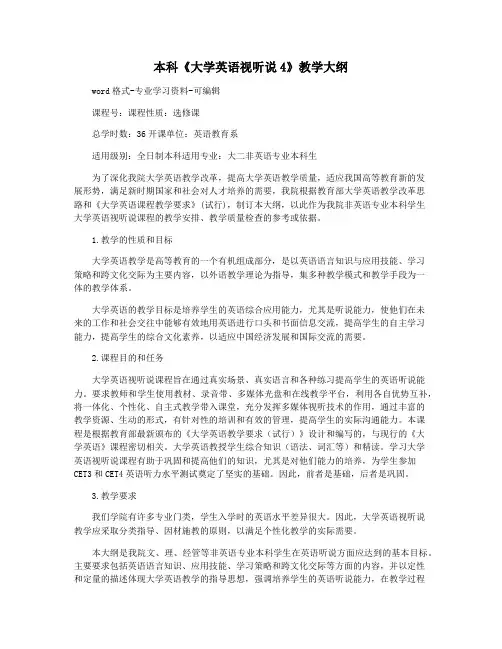
本科《大学英语视听说4》教学大纲word格式-专业学习资料-可编辑课程号:课程性质:选修课总学时数:36开课单位:英语教育系适用级别:全日制本科适用专业:大二非英语专业本科生为了深化我院大学英语教学改革,提高大学英语教学质量,适应我国高等教育新的发展形势,满足新时期国家和社会对人才培养的需要,我院根据教育部大学英语教学改革思路和《大学英语课程教学要求》(试行),制订本大纲,以此作为我院非英语专业本科学生大学英语视听说课程的教学安排、教学质量检查的参考或依据。
1.教学的性质和目标大学英语教学是高等教育的一个有机组成部分,是以英语语言知识与应用技能、学习策略和跨文化交际为主要内容,以外语教学理论为指导,集多种教学模式和教学手段为一体的教学体系。
大学英语的教学目标是培养学生的英语综合应用能力,尤其是听说能力,使他们在未来的工作和社会交往中能够有效地用英语进行口头和书面信息交流,提高学生的自主学习能力,提高学生的综合文化素养,以适应中国经济发展和国际交流的需要。
2.课程目的和任务大学英语视听说课程旨在通过真实场景、真实语言和各种练习提高学生的英语听说能力。
要求教师和学生使用教材、录音带、多媒体光盘和在线教学平台,利用各自优势互补,将一体化、个性化、自主式教学带入课堂,充分发挥多媒体视听技术的作用,通过丰富的教学资源、生动的形式,有针对性的培训和有效的管理,提高学生的实际沟通能力。
本课程是根据教育部最新颁布的《大学英语教学要求(试行)》设计和编写的,与现行的《大学英语》课程密切相关。
大学英语教授学生综合知识(语法、词汇等)和精读。
学习大学英语视听说课程有助于巩固和提高他们的知识,尤其是对他们能力的培养,为学生参加CET3和CET4英语听力水平测试奠定了坚实的基础。
因此,前者是基础,后者是巩固。
3.教学要求我们学院有许多专业门类,学生入学时的英语水平差异很大。
因此,大学英语视听说教学应采取分类指导、因材施教的原则,以满足个性化教学的实际需要。
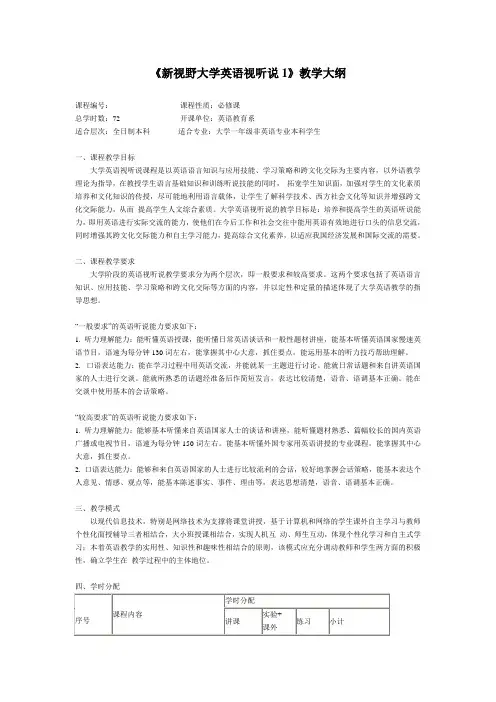
《新视野大学英语视听说1》教学大纲课程编号:课程性质:必修课总学时数:72 开课单位:英语教育系适合层次:全日制本科适合专业:大学一年级非英语专业本科学生一、课程教学目标大学英语视听说课程是以英语语言知识与应用技能、学习策略和跨文化交际为主要内容,以外语教学理论为指导,在教授学生语言基础知识和训练听说技能的同时,拓宽学生知识面,加强对学生的文化素质培养和文化知识的传授,尽可能地利用语言载体,让学生了解科学技术、西方社会文化等知识并增强跨文化交际能力,从而提高学生人文综合素质。
大学英语视听说的教学目标是:培养和提高学生的英语听说能力,即用英语进行实际交流的能力,使他们在今后工作和社会交往中能用英语有效地进行口头的信息交流,同时增强其跨文化交际能力和自主学习能力,提高综合文化素养,以适应我国经济发展和国际交流的需要。
二、课程教学要求大学阶段的英语视听说教学要求分为两个层次,即一般要求和较高要求。
这两个要求包括了英语语言知识、应用技能、学习策略和跨文化交际等方面的内容,并以定性和定量的描述体现了大学英语教学的指导思想。
“一般要求”的英语听说能力要求如下:1. 听力理解能力:能听懂英语授课,能听懂日常英语谈话和一般性题材讲座,能基本听懂英语国家慢速英语节目,语速为每分钟130词左右,能掌握其中心大意,抓住要点。
能运用基本的听力技巧帮助理解。
2. 口语表达能力:能在学习过程中用英语交流,并能就某一主题进行讨论。
能就日常话题和来自讲英语国家的人士进行交谈。
能就所熟悉的话题经准备后作简短发言,表达比较清楚,语音、语调基本正确。
能在交谈中使用基本的会话策略。
“较高要求”的英语听说能力要求如下:1. 听力理解能力:能够基本听懂来自英语国家人士的谈话和讲座,能听懂题材熟悉、篇幅较长的国内英语广播或电视节目,语速为每分钟150词左右。
能基本听懂外国专家用英语讲授的专业课程。
能掌握其中心大意,抓住要点。
2. 口语表达能力:能够和来自英语国家的人士进行比较流利的会话,较好地掌握会话策略,能基本表达个人意见、情感、观点等,能基本陈述事实、事件、理由等,表达思想清楚,语音、语调基本正确。
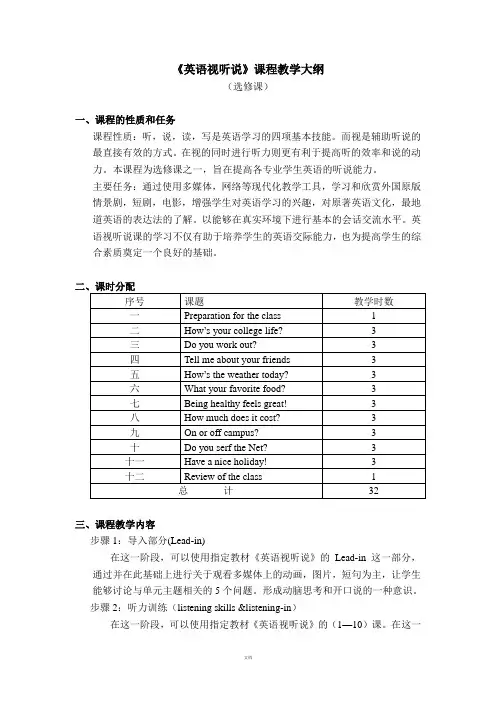
《英语视听说》课程教学大纲(选修课)一、课程的性质和任务课程性质:听,说,读,写是英语学习的四项基本技能。
而视是辅助听说的最直接有效的方式。
在视的同时进行听力则更有利于提高听的效率和说的动力。
本课程为选修课之一,旨在提高各专业学生英语的听说能力。
主要任务:通过使用多媒体,网络等现代化教学工具,学习和欣赏外国原版情景剧,短剧,电影,增强学生对英语学习的兴趣,对原著英语文化,最地道英语的表达法的了解。
以能够在真实环境下进行基本的会话交流水平。
英语视听说课的学习不仅有助于培养学生的英语交际能力,也为提高学生的综合素质奠定一个良好的基础。
三、课程教学内容步骤1:导入部分(Lead-in)在这一阶段,可以使用指定教材《英语视听说》的Lead-in这一部分,通过并在此基础上进行关于观看多媒体上的动画,图片,短句为主,让学生能够讨论与单元主题相关的5个问题。
形成动脑思考和开口说的一种意识。
步骤2:听力训练(listening skills &listening-in)在这一阶段,可以使用指定教材《英语视听说》的(1—10)课。
在这一部分,教材每课都分为listening skills 和listening-in两部分。
listening skills 中主要设计了一些简易的短对话听力练习,可提供正常和慢速两种语速,且可任选语段复听,题型主要为选择填空题。
listening-in中主要以与主题相关的听力材料为主,配有生词与语言点讲解,内容丰富,形式多样。
题型为选择题和填充题和问答题。
这一部分有助于培养学生抓住主要内容及迅速反应的能力,速记能力,是学生听力提高的一个重要途径,也为学生进行口语训练打下听力基础。
同时,第二阶段的实际操作中,可以加入一些辅助材料,如英语原版电影,不仅可以培养学生的英语学习兴趣,也可以丰富教学内容,对提高学生的听力水平也有一定的帮助。
步骤3:口语训练(speaking out)我们称这一阶段为操练阶段,可分为speaking out 和Let’s talk两个部分。
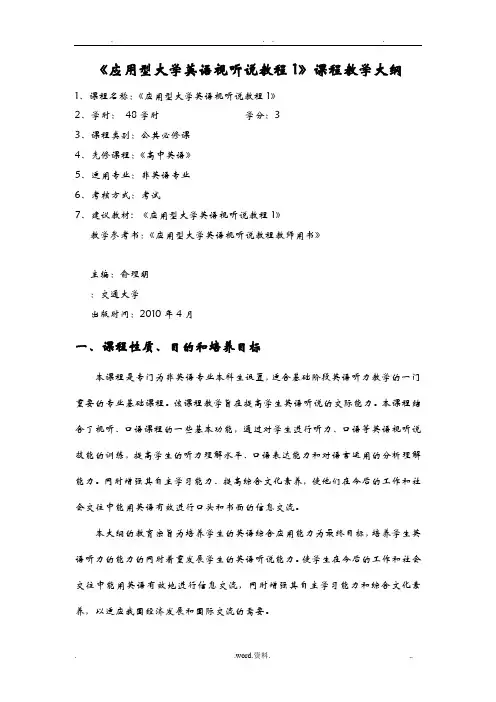
《应用型大学英语视听说教程1》课程教学大纲1、课程名称:《应用型大学英语视听说教程1》2、学时:48学时学分:33、课程类别:公共必修课4、先修课程:《高中英语》5、适用专业:非英语专业6、考核方式:考试7、建议教材: 《应用型大学英语视听说教程1》教学参考书:《应用型大学英语视听说教程教师用书》主编:俞理明:交通大学出版时间:2010年4月一、课程性质、目的和培养目标本课程是专门为非英语专业本科生设置,适合基础阶段英语听力教学的一门重要的专业基础课程。
该课程教学旨在提高学生英语听说的交际能力。
本课程结合了视听、口语课程的一些基本功能,通过对学生进行听力、口语等英语视听说技能的训练,提高学生的听力理解水平、口语表达能力和对语言运用的分析理解能力。
同时增强其自主学习能力、提高综合文化素养,使他们在今后的工作和社会交往中能用英语有效进行口头和书面的信息交流。
本大纲的教育宗旨为培养学生的英语综合应用能力为最终目标,培养学生英语听力的能力的同时着重发展学生的英语听说能力。
使学生在今后的工作和社会交往中能用英语有效地进行信息交流,同时增强其自主学习能力和综合文化素养,以适应我国经济发展和国际交流的需要。
二、教学容和基本要求教学容:Unit1 Dreams(6学时)PartⅠWarm-up 0.5 学时Part ⅡListen and watch 3.5 学时Section One Listen for pronunciation skillsSection Two Special English programsA. Item 1 “I Have a Dream” ProgramB. Item 2 The American DreamC. Item 3 Really Achieving Your Childhood DreamsSection Three Read after meSection Four Real world Believe in Your DreamsLeisure Time The Power of the DreamPart ⅢLet’s talk 1 学时Section One Commencement speechSection Two Your turnPart ⅣSupplementary tasks 1学时A. Dubbing We Have Different DreamsB. Story dictation I Feel too Tired to WalkUnit2The People We Know(6学时)Part I Warm-up 0.5学时Part ⅡListen and watch 3.5学时Section One Listen for pronunciation skillsSection Two Special English programsA. Item 1 Mark Twain: One of America’s Best-known and Best-loved WritersB. Item 2 Martin Luther King: the Man Who Gained Equal Rights for Black AmericansC. Item 3 Helen Keller: She Gave Others HopeSection Three Read after meSection Four Real world Family and Fans Say Goodbye to Michael Jackson Leisure Time Heal the WorldPart ⅢLet’s talk 1学时Section One Interview with a celebritySection Two Your turnPart ⅣSupplementary tasks 1学时A. Dubbing The QueenB. Story dictation Friendship between Roosevelt and ChurchillUnit3 Animals(6学时)Part I Warm-up 0.5学时Part ⅡListen and watch 3.5学时Section One Listen for pronunciation skillsSection Two Special English programsA. Item 1 Shark DivingB. Item 2 PlatypusC. Item 3 Indian Camels DecreasingSection Three Read after meSection Four Real world A Cat Has Nine LivesLeisure Time A Whole New WorldPart ⅢLet’s talk 1学时Section One Adopting an animalSection Two Your turnPart ⅣSupplementary tasks 1学时A. Dubbing Tom and JerryB. Story dictation The Town Mouse and the Country MouseUnit4 Romance(6学时)Part I Warm-up 0.5学时Part ⅡListen and watch 3.5学时Section One Listen for pronunciation skillsSection Two Special English programsA. Item 1 DateB. Item 2 CinderellaC. Item 3 Destination WeddingSection Three Read after meSection Four Real world The Lion KingLeisure Time Pretty BoyPart ⅢLet’s talk 1学时Section One Meeting your dream girl/boySection Two Your turnPart ⅣSupplementary tasks 1学时A. Dubbing Beauty and the BeastB. Story dictation The Man Who Loved Women Unit5Crime and Punishment(6学时)Part I Warm-up 0.5学时Part ⅡListen and watch 3.5学时Section One Listen for pronunciation skillsSection Two Special English programsA. Item 1 City and CrimeB. Item 2 Killing at Virginia TechC. Item 3 Capital Punishment in JapanSection Three Read after meSection Four Real world Jack Stark Private Detective Leisure Time Old Straw HatPart ⅢLet’s talk 1学时Section One Court cross-examinationSection Two Your turnPart ⅣSupplementary tasks 1学时A. Dubbing A Mock TrialB. Story dictation A Bank RobberyUnit6 Food(6学时)Part I Warm-up 0.5学时Part ⅡListen and watch 3.5学时Section One Listen for pronunciation skillsSection Two Special English programsA. Item 1 Canned FoodB. Item 2 Frozen FoodC. Item 3 Country of Origin LabelingSection Three Read after meSection Four Real world How to Cook Sichuan Orange Beef Leisure Time Tom’s DinerPart ⅢLet’s talk 1学时Section One Ordering dishes in a restaurantSection Two Your turnPart ⅣSupplementary tasks 1学时A. Dubbing Pull Yourself Together, PalB. Story dictation Who Got the Message?Unit7Language Without Voice(6学时)Part I Warm-up 0.5学时Part ⅡListen and watch 3.5学时Section One Listen for pronunciation skillsSection Two Special English programsA. Item 1 Washoe Learned a Human LanguageB. Item 2 American Sign LanguageC. Item 3 A New Language of MovementSection Three Read after meSection Four Real world How to Use Body Language to Improve Presentation Leisure Time Body LanguagePart ⅢLet’s talk 1学时Section One Body LanguageSection Two Your turnPart ⅣSupplementary tasks 1学时A. Dubbing Smurfing in Sign LanguageB. Story dictation A Tin of DisappearUnit8 Travel(6学时)Part I Warm-up 0.5学时Part ⅡListen and watch 3.5学时Section One Listen for pronunciation skillsSection Two Special English programsA. Item 1 Autumn in WashingtonB. Item 2 The Statue of LibertyC. Item 3 Carlsbad CavernSection Three Read after meSection Four Real world Travel in ParisLeisure Time Traveling LightPart ⅢLet’s talk 1学时Section One At the travel agencySection Two Your turnPart ⅣSupplementary tasks 1学时A. Dubbing Joey and Chandler in LondonB. Story dictation Travel in the Far East基本要求:本大纲参照《大学英语课程教学要求》,立足于一般要求,鼓励学生向较高要求和最高要求调整自己的学习目标。
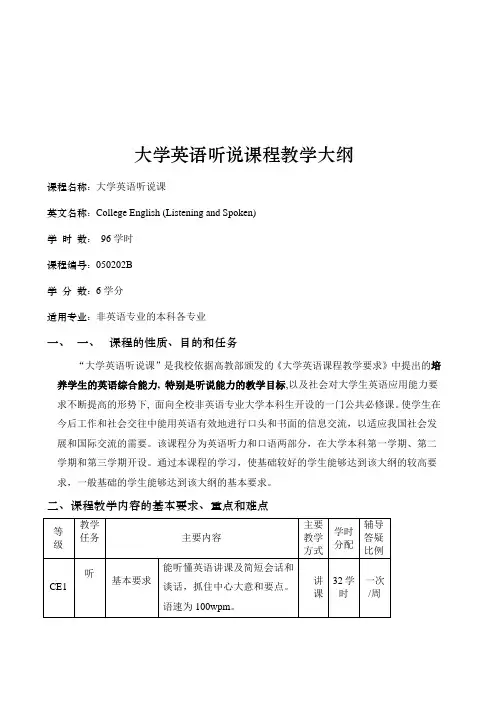
大学英语听说课程教学大纲课程名称:大学英语听说课英文名称:College English (Listening and Spoken)学时数:96学时课程编号:050202B学分数:6学分适用专业:非英语专业的本科各专业一、一、课程的性质、目的和任务“大学英语听说课”是我校依据高教部颁发的《大学英语课程教学要求》中提出的培养学生的英语综合能力, 特别是听说能力的教学目标,以及社会对大学生英语应用能力要求不断提高的形势下, 面向全校非英语专业大学本科生开设的一门公共必修课。
使学生在今后工作和社会交往中能用英语有效地进行口头和书面的信息交流,以适应我国社会发展和国际交流的需要。
该课程分为英语听力和口语两部分,在大学本科第一学期、第二学期和第三学期开设。
通过本课程的学习,使基础较好的学生能够达到该大纲的较高要求,一般基础的学生能够达到该大纲的基本要求。
二、课程教学内容的基本要求、重点和难点四、课程各教学环节的要求要求听说课在语音室上,每周一次两学时。
学生在课后参加学校组织的周英语角活动、各种英语晚会,每个班级每周组织一次英语角;学生上网做网上听说练习。
五、本课程与其他课程的联系本课程的后续课程是高年级的高级英语听说选修课。
六、考核方式大学英语听说课是考试课,考试形式是(1)由主考教师对学生进行小组面试;(2)组织听力考试;(3)通过网络测试手段,检查学生完成指定的网络测试项目。
评分标准:口试占40%,听力占60%,合计100分。
七、教学参考书目1、《新视野大学英语》听说教程1-4外语教学与研究出版社2001年底1版2、《大学英语听力分级教程》上、下册。
孙力主编。
吉林科学技术出版社出版。
2002年3、《新编大学英语》1、2、3、4册。
浙江大学编著。
外语教学与研究出版社。
1999年4月第一版。
2004 至2005 学年度第一学期04级各班《大学英语听力》课程授课计划一、一、说明1.1.课程的教学目的要求通过这一学期的英语教学,培养学生具有一定的听、说能力。
西安交通大学“高级英语视听说”课程教学大纲英文名称:Advanced English through Audio Visual Means课程编号:ENGL3015学时:64(含课外学时16)学分:3适用对象:英语专业三年级学生先修课程:英语听力、英语口语、基础英语视听说课程性质、目的和任务性质:高级英语视听说是英语专业三年级学生在完成一、二年级基础英语视听说课后的提高课程,属于专业必修技能课。
目的:本课程通过大量的相关背景知识阅读、观看英文电影、课堂分析讨论,旨在进一步提高学生的英语听力理解和口头表达能力;了解英语国家(主要是美国和英国)的文化,包括历史、地理、人文、社会、习俗、生活等方面;同时培养学生初步的调查研究及批判性思维的能力。
通过两个学期的学习,使学生能够听懂反映英美国家人们日常生活的英文原声电影,积累一定的文化知识,并能针对电影中反映的文化现象做初步的分析、评论,用英文表达自己的思想。
任务:本课程以任务教学法为主。
每课基本遵循三个阶段:1. 观看前预习:教师在每堂课课前都会以关键词的形式给学生布置预习相关历史、文化背景知识的任务,由学生课外准备;课堂上学生分组限时按专题使用自己制作的PowerPoint课件进行汇报并回答问题。
目的在于培养学生查找相关资料进行科学研究的自主学习能力,让学生有机会使用英语进行实践并互相学习。
2. 观看中分析:在做好准备工作之后对使用的影视材料采取边观看边分析理解的处理方法。
看影片之前教师根据内容提出几个对影片主旨大意的理解性问题及个别重要细节的问题,让学生们带着问题有目的地看,边看边思考;在观看影片的过程中以“教师提问-学生回答-教师讲解”的形式处理解决影片重要细节、文化点及语言方面的难点。
3. 观看后讨论:影片观看完毕之后,学生分组讨论相关问题、记录,然后向全班做汇报并回答听众的提问。
用这种方式可以检查学生对所看影片的理解程度、培养他们批判性思维的能力并锻炼他们的归纳总结、口头表达、及应变等综合能力。
大学英语听说课程教学大纲课程名称:大学英语听说课英文名称:College English (Listening and Spoken)学时数:96学时课程编号:050202B学分数:6学分适用专业:非英语专业的本科各专业一、一、课程的性质、目的和任务“大学英语听说课”是我校依据高教部颁发的《大学英语课程教学要求》中提出的培养学生的英语综合能力, 特别是听说能力的教学目标,以及社会对大学生英语应用能力要求不断提高的形势下, 面向全校非英语专业大学本科生开设的一门公共必修课。
使学生在今后工作和社会交往中能用英语有效地进行口头和书面的信息交流,以适应我国社会发展和国际交流的需要。
该课程分为英语听力和口语两部分,在大学本科第一学期、第二学期和第三学期开设。
通过本课程的学习,使基础较好的学生能够达到该大纲的较高要求,一般基础的学生能够达到该大纲的基本要求。
二、课程教学内容的基本要求、重点和难点四、课程各教学环节的要求要求听说课在语音室上,每周一次两学时。
学生在课后参加学校组织的周英语角活动、各种英语晚会,每个班级每周组织一次英语角;学生上网做网上听说练习。
五、本课程与其他课程的联系本课程的后续课程是高年级的高级英语听说选修课。
六、考核方式大学英语听说课是考试课,考试形式是(1)由主考教师对学生进行小组面试;(2)组织听力考试;(3)通过网络测试手段,检查学生完成指定的网络测试项目。
评分标准:口试占40%,听力占60%,合计100分。
七、教学参考书目1、《新视野大学英语》听说教程1-4外语教学与研究出版社2001年底1版2、《大学英语听力分级教程》上、下册。
孙力主编。
吉林科学技术出版社出版。
2002年3、《新编大学英语》1、2、3、4册。
浙江大学编著。
外语教学与研究出版社。
1999年4月第一版。
2004 至2005 学年度第一学期04级各班《大学英语听力》课程授课计划一、一、说明1.1.课程的教学目的要求通过这一学期的英语教学,培养学生具有一定的听、说能力。
重点提高学生的听力水平使学生达到大学英语一级水平,进一步提高学生运用英语的综合能力。
2.2.学时数分配情况:《新视野大学英语听说教程》第一册《大学英语听力分级教程》《新视野大学英语》教师用书《大学英语口语分级教程》《现代英语用法词典》《柯林斯精选英语辞典》等。
4.4.成绩考核方式和及格标准:成绩考核方式:听力为闭卷考试。
及格标准:听力+ 口语=100分,60分为及格。
5.5.学生学习本课程的要求:要求学生课上认真听讲,课后复习以便巩固知识,按要求完成各项作业,保证课外自己每天练习听力。
6.提高教学质量的措施:●●在教学中不断探索教学规律,推广教改成果,坚持集体备课,细致批改作业,及时进行讲评,定期对学生进行阶段水平考试。
●●进行听力、口语训练,注意与学生互动。
●●开展丰富多彩的第二课堂活动,完善教学效果二、授课计划总教学周15周。
“十一”放假一周。
院(系)院长(主任):课程负责人:任课教师:Lesson Plan Unit 1Lesson Plan Designer: Xv XiaoyingType of the lesson: Listening and SpeakingClass:Student entry level:Students at the level of Senior Middle SchoolTime available of the whole unit : 2 periods(100 min) in totalInstructional goals: Help students reach the level of CE1 described in the Teaching Syllabus of the Course for Listening and Speaking of College English, Anshan University of Science and Technology, which is displayed at the beginning of the Lesson Planning Notes. (达到鞍山科技大学大学英语听说课程教学大纲规定的CE1级别的课程教学内容的基本要求, 参见教案首页: 听力:听力:能大概听懂英语国家人士讲话和讲座,能基本听懂题材熟悉、篇幅较长的国内广播或电视节目,语速为每分钟130词左右,能掌握中心大意抓住要点。
口语:能和英语国家人士进行一定程度的交流,能够掌握一定的会话策略,能基本表达个人意见、情感、观点等,能基本陈述事实、事件、理由等,语音、语调基本正确。
).Objectives: After learning this unit, students are expected to make progress in the following two aspects.1. 1.Listening: Students should learn to be accustomed to college listening class, for example, how tounderstand a conversation, get used to long passages. After learning the article, they can put theirknowledge into listening.2. 2.Speaking: Students learn to describe his or her own family, about his or her father, mother and aboutthemselves. They will learn to use simple and understandable English to express himself or herself. Teaching Content:1. 1.Listening: Unit 1, Listing Text Book 11)1)Learning New Words2)2)Listening practices2. 2.Speaking: Unit 1, Spoken English for College Students1)1)Learning New Words2) Learning useful sentences and paragraphs needed fo r describing one’s family.Teaching Methods:Under the guidance of student-centered principle, apply communicative and heuristic teaching methods, stimulate students’ interest in learning English and get students involved in class participation.Facilities or resources:Sound lab.Instructional procedures and time allocation:The lesson will be divided into two parts. Part one is Listening and part two is Speaking. Each part will take 50 minutes.I. The first period: Listening comprehension, (50 min).a) New words at page 5.b) Section A: 20 words in our articlec) Section B: 20 sentences. Students will answer the question after what they have heard.d) Section C: 3 passages and followed by 15 true or false questions.e) section D: 3 passages and followed by 15 questions.2.The second period: Speaking practice, (50 min).a) Section One: Essential Vocabularyb) Section Two: Useful Sentences1. 1.I love my family very much and I get along well with my family members.2. 2.I have an extended family.3. 3.My great parents live together with us.4. 4.My gather is a worker/ farmer/doctor/engineer/factory director/manager director﹍5. 5.My mother works in a hospital/railway station/factory/supermarket﹍6. 6.We live together.7.7.Our relatives live in﹍and I miss them very much.8.8.My mother has retired. My father is due to retire this year.9.9.My elder sister works, but she is still single.c) Section Three: Possible Questions and AnswersA:where were you born?B: I was born in ﹍which is beautiful seaside city.A: When did you move to﹍B:I moved to ﹍in 1991when my parents transferred their jobA: Who are the members of your family?B: My parents, a younger sister, and i.A: What are your parents doing?B: They are farmers and still work to support our family.A: What did your parents do before they were retired?B: My father was a businessman and my mother was an accountant.A: Do you have any brothers or sisters? What are their jobs?B: Yes, I have a brother who works in a shoe factory and a sister who is a primary school student.d) Section Four: Example ParagraphsExample II have a medium-sized family, my parents, my elder brother, a younger sister, and I. My father and my mother are both retired. Now they run a broth in down town area. My younger sister is a senior school student, who works hard. My elder brother who has graduated from Beijing University is now working in a big company as a department manager. He is very sociable and popular with his colleagues. He usually sends money to me. Every member of my family cooperates well. We love each other.Example 2I was born in﹍,but moved to﹍when I was 16. my parents are both doctors, and were assigned to work in a hospital there. They are both retired now. I came to Shanghai in 1993 to study economic at Fudan University, where I met my girlfriend. We got married after we graduated, and still lived there. I also have an elder brother who lives in﹍with his wife and a younger sister who still lives in﹍with our parents.Example3I dream of a large family, because I believe that I can find more advantages. Among brothers and sisters, I can earn about the true intellectual of understanding people: patience, forgiveness, sharing, receiving, trust , faithfulness, prudence and friendship.The family is the building block of society. When I have matured within the home, I am ready to go out into the world.e) Section Five: Partnership ActivityWork with your partner to talk about your family according to the following subtopics:1. 1.One of your family members who has had the most influence in your life.2. 2.One of your family members whom you love most.3. 3.How the family environments shape a person’s character and future.4. 4.The pressure you might feel from your family.5. 5.The generation gap between you and your parents.f) Section Six: Debate ActivityDivide the class into two groups and argue the following matter pro and con:Family environment is essential to our success in the future.G) Section seven: picture TalkingDescribe the picture and then give your comment on what you see in the picture. The words given below are for your reference.h) Section eight: language tipsOffering suggestionsA: what’s wrong?B:I am bored. What can I do?A: Why don’t you watch TV?B:I can’t. it is broken. Anyway, there is nothing good on tonight.A: Oh dear. Well, how about coming to the cinema with me, then? We can go to the Odeon. B: That is not a bad idea. Ok If you pay for me.A: Oh! Well, in that case, what about going to a disco?B: Good idea! And I will pay for you ! let’s go!A: Right then!Assignment Projects:Ask students to attend the English corner of the campus.Reflection/Teaching Diary:( Omit) (After class)Lesson Plan Unit 2Lesson Plan Designer: Huang XuemeiType of the lesson: Listening and SpeakingClass: Class1,2 of Law2004, Mineral Resources Engineering2004, Measurement and Survey Engineering2004Student entry level: Students at the level of Senior Middle SchoolTime available of the whole unit : 2 periods(100 min) in total?Instructional goals: Help students reach the level of CE1 described in the Teaching Syllabus of the Course for Listening and Speaking of College English, Anshan University of Science and Technology, which is displayed at the beginning of the Lesson Planning Notes. (达到鞍山科技大学大学英语听说课程教学大纲规定的CE1级别的课程教学内容的基本要求, 参见教案首页: 听力:能大概听懂英语国家人士讲话和讲座,能基本听懂题材熟悉、篇幅较长的国内广播或电视节目,语速为每分钟130词左右,能掌握中心大意抓住要点。